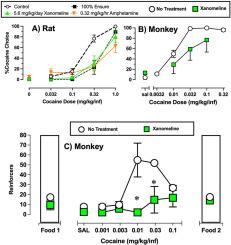Xanomeline treatment attenuates cocaine self-administration in rats and nonhuman primates
IF 4.6
2区 医学
Q1 NEUROSCIENCES
引用次数: 0
Abstract
The lack of an FDA-approved pharmacotherapy to combat cocaine use disorder (CUD) is an ongoing and urgent public health challenge. Emerging evidence suggests that the muscarinic acetylcholine system modulates mesolimbic dopamine release and thus may serve as a suitable target for novel CUD medications. The M1/M4-preferring muscarinic agonist xanomeline was recently approved by the Food and Drug Administration for schizophrenia management, and a previous study in male rats suggested that xanomeline treatment attenuated cocaine self-administration in a cocaine-vs-food choice procedure. The present study was conducted to further examine xanomeline treatment effectiveness on cocaine self-administration in male and female rats and nonhuman primates. Both male and female rats and monkeys were trained to self-administer cocaine during daily behavioral sessions. Repeated xanomeline treatment significantly decreased cocaine choice in rats similar to both pharmacological (amphetamine maintenance) and non-pharmacological (increasing alternative reinforcer value) positive controls. In separate groups of monkeys, acute xanomeline pretreatment decreased cocaine-vs-food choice in three out of four monkeys and selectively decreased cocaine-, but not food-maintained responding, under a multiple schedule of cocaine and food reinforcement in three out of four monkeys. Overall, the consistent effectiveness of xanomeline to reduce IV cocaine self-administration in both rodents and nonhuman primate supports its further evaluation as a CUD medication in humans.

Xanomeline治疗减少了大鼠和非人灵长类动物的可卡因自我给药。
缺乏fda批准的药物治疗来对抗可卡因使用障碍(CUD)是一个持续和紧迫的公共卫生挑战。新出现的证据表明,毒蕈碱乙酰胆碱系统调节中脑边缘多巴胺释放,因此可能作为新型CUD药物的合适靶点。偏爱M1/ m4的毒蕈碱激动剂xanomeline最近被美国食品和药物管理局批准用于精神分裂症的治疗,之前在雄性大鼠中的一项研究表明,xanomeline治疗在可卡因与食物选择过程中减少了可卡因的自我给药。本研究进一步探讨了异诺米林对雄性、雌性大鼠和非人灵长类动物可卡因自我给药的治疗效果。研究人员训练雄性、雌性老鼠和猴子在日常行为训练中自我使用可卡因。重复的黄嘌呤治疗显著减少了大鼠对可卡因的选择,这与药理学(安非他明维持)和非药理学(增加替代强化物值)阳性对照相似。在不同的猴子组中,急性黄嘌呤预处理减少了四分之三的猴子对可卡因和食物的选择,并选择性地减少了四分之三的猴子在可卡因和食物强化的多重计划下对可卡因的反应,而不是食物维持的反应。总的来说,在啮齿类动物和非人灵长类动物中,xanomeline减少静脉可卡因自我给药的一致性有效性支持其作为人类CUD药物的进一步评估。
本文章由计算机程序翻译,如有差异,请以英文原文为准。
求助全文
约1分钟内获得全文
求助全文
来源期刊

Neuropharmacology
医学-神经科学
CiteScore
10.00
自引率
4.30%
发文量
288
审稿时长
45 days
期刊介绍:
Neuropharmacology publishes high quality, original research and review articles within the discipline of neuroscience, especially articles with a neuropharmacological component. However, papers within any area of neuroscience will be considered. The journal does not usually accept clinical research, although preclinical neuropharmacological studies in humans may be considered. The journal only considers submissions in which the chemical structures and compositions of experimental agents are readily available in the literature or disclosed by the authors in the submitted manuscript. Only in exceptional circumstances will natural products be considered, and then only if the preparation is well defined by scientific means. Neuropharmacology publishes articles of any length (original research and reviews).
 求助内容:
求助内容: 应助结果提醒方式:
应助结果提醒方式:


